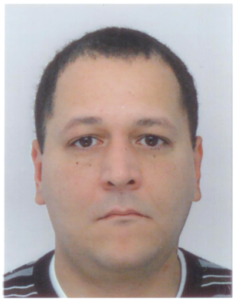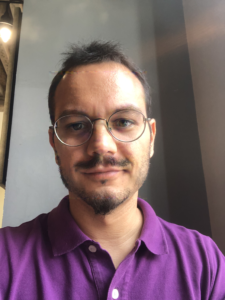Our project ‘Characterization of the MUC4-TRPM7 complex and associated cellular mechanisms. Identification of key regulators through spatial transcriptomics’ will be funded following the INCa PLBIO 2024 call for projects—a fruitful collaboration between the ONCOLille teams Mucins and DISCO.
Our new preprint, “A co-regulatory influence map of glioblastoma heterogeneity and evolution—From cells in vitro to tumors and back again”, is now on bioRxiv! https://www.biorxiv.org/content/10.1101/2024.08.23.609303v1
New Master’s Program : Digital Health Device Design (Starting Septembre 2024). Co-responsable : Dr. D. Zitouni & Dr W. Dhifli. https://www.univ-lille.fr/formations/fr-00171115
Our project ‘Regulation network of the oncogene addiction triggers by MET receptor in lung cancer’ will be funded following the INCa PLBIO 2022 call for projects—a fruitful collaboration between the ONCOLille teams Target and DISCO.
L’étude des réseaux de régulation (voies de signalisation, régulation transcriptionnelle, et métabolique) émerge comme une approche majeure dans la compréhension et la prise en charge des cancers. Cette vision systémique permet de mieux comprendre le rôle des modifications génétiques et épigénétiques ainsi que la stabilité et la plasticité du réseau de régulation dans le phénotype tumoral, et la sensibilité ou la résistance aux traitements.
En exploitant les principes de la biologie des systèmes et les techniques d’intelligence artificielle (IA), notre équipe computationnelle contribue à :
• Combler le fossé entre la production de données biologiques à haut débit et les outils analytiques afin d’améliorer notre compréhension des principes systémiques de la biologie du cancer.
• Étudier les réseaux de régulation pour élucider les mécanismes de la tumorigénèse, l’hétérogénéité cellulaire et la résistance aux
thérapies.
• Développer et diffuser des outils Bio-IT basés sur l’IA, compréhensibles et fiables pour les scientifiques, afin de permettre une utilisation efficace dans les recherches biologiques.
Pour atteindre ces objectifs, nous concevons et développons de nouveaux algorithmes et logiciels pour inférer et analyser des réseaux de régulation à partir de données ‘omiques’, interpréter et intégrer des systèmes biologiques basés sur les réseaux, explorer la causalité des réseaux et générer des hypothèses fondées sur ces réseaux. Nos approches incluent l’apprentissage automatique, la représentation des connaissances, et l’automatisation de la bioscience en boucle fermée.
Nous partageons nos outils sous forme de packages open-source gratuits et d’applications web. Par exemple, pour l’inférence/reconstruction de réseaux : LICORN/CoRegNet, PreCisIon ; pour l’analyse/interrogation de réseaux : PEPPER, skyclust, LatNET, cRegMap ; pour l’intervention/révision de réseaux : Adalab, CoRegFlux, GREAT.
Nous accueillons régulièrement des étudiants en master et en doctorat, des postdocs et des ingénieurs. Si vous souhaitez vous joindre à nous, veuillez nous envoyer votre candidature.
> CHERCHEURS
> INGENIEURS/TECHNICIENS
> ETUDIANTS
CHERCHEURS
| Pr Mohamed ELATI, Université de Lille |
| Dr Wajdi DHIFLI, Maître de Conférence, Université de Lille |
| Dr Nour KARABADJI, Maître de Conférence, Université d’Annaba noud.karabadji(@)univ-lille.fr |
| Dr Djamel ZITOUNI, Maître de Conférence, Université de Lille Research field: Knowledge representation, visual analytics, software development, Health informatics.. djamel.zitouni(@)univ-lille.fr |
| Dr Chloé BERNHARD, Cheffe de Projet , INCa EN-HOPE SMART4CBT Research field: Project and data sharing, Bioinformatics, systems biology, molecular classification. chloe.bernhard(@)univ-lille.fr |
| Dr Konstantinos GELES, Post-Doct, Université de Lille Research field: computational biology, multi-omics, data integration, molecular classification. geles.konstantinos(@)univ-lille.fr |
INGENIEURS/TECHNICIENS
| Jules DUSOL, Ingénieur d’études, Université de Lille jules.dusol(@)univ-lille.fr |
| Nadia BENNACEUR, Technicien de la Recherche, Université de Lille nadia.bennaceur(@)univ-lille.fr |
ETUDIANTS
| Geoffrey PAWLAK (D3, PhD) geoffrey.pawlak.etu(@)univ-lille.fr |
| Nathan LANERET (D2, PhD)nathan.laneret.etu(@)univ-lille.fr |
| Ines HADJADJI (D2, PhD)ines.hadjadhji.etu(@)univ-lille.fr |
| Liangwei YIN (D1, PhD).etu(@)univ-lille.fr |
Projet d’équipe
We propose to develop CANTHER.XAI (eXplainable AI engine to accelerate CANcer systems THERapeutics) to rationalize cancer systems therapeutics research through an AI closed-loop system. This loop comprises three fundamental components: Inference (from experimental cellular models), Interrogation (to patients), and Intervention (feedback to cellular models) with regulatory networks. By utilizing this loop alongside regulatory networks, we bridge the gap between cellular models and human levels to construct a large-scale manifold of disease states using machine learning embedding techniques. As of today, while large molecular datasets are technically available publicly, this data is not accessible to all and not interoperable. CANTHER-XAI aims to aggregate and help the scientific community exploit all available datasets. This large-scale manifold will provide us with crucial insights into master regulators, matched cellular models, actionable interventions, and patient populations likely to respond positively to treatments.
Projets financés
Europe:
2021-2024 : GREENER: Gene and Regulatory Elements Networks Involved in Rice Root Tissue Differentiation. – PRCI ANR/FNR – Coordinator Dr. Christophe Perin (CIRAD, Montpellier), Role : PI Univ. Lille-CANTHER – 800 K€. (own funding 195K€).
2015-2018 : Adaptive « Automated Scientific Laboratory – AdaLab » – CHIST-ERA – Coordinators Prof. Larisa Soldatova (Brunel University), Prof. Ross King (Univ. of Manchester) – 1300 K€. Role : ANR coordinateur, PI UEVE-iSSB (198K€).
2012-15: “A system biology approach to dissect cilia function and its disruption in human genetic disease” – SYSCILIA (EC FP7 – Health Cooperation programme). Coordinator Dr. Ronald Roepman (Univ of Nigmegen) – €1200K. Role: PI UEVE-iSSB (200K€)
National:
2024-2028: Siric Pediatric: En-Hope Smart4cbt. « East North-Hematology Oncology PEdiatric consortium offering a research program of Social sciences, Microenvironment and multiomics Analysis in RadioTherapy resistance For Children Brain Tumors ». 2024-2028. Budget: €3 million. Role Tasks co-leader.
2022-2024 : NETMET: Regulation network of the oncogene addiction triggers by MET receptor in lung cancer, INCa PLBIO. Role PI Univ. Lille-CANTHER (own funding: 58 K€)
2018-2022 : INTEGRIN: Systems biology of integrin inhibition-induced apoptosis for novel glioblastoma treatment, INCa PLBIO, Grant N2017-145. Role PI Univ. Lille-CANTHER (own funding: 115 K€)
2015-2019 : LIONs: Large-scale Integrative approach to unravel the relationships between differentiatiON and tumorigenesiS. ITMO cancer/INSERM 2015 – coordinator: Mohamed Elati 750 K€. Role: coordinator PI Univ Lille-CANTHER (220K€)
2016-2019 : CHASSY: From multi-scale modeling of biological network to engineering metabolic circuits in a biotechnology chassis, Paris-Saclay IDEX, Grant Programme Interdisciplinaire IDI (co-PI), Horizon 2020 No 7208242014-16: « Ingénierie robuste et évolution dirigée de voies métaboliques synthétiques par intégration des approches génomique » coordinator. Dr. François Jean-Marie (INSA Toulouse) – 500€K Rôle: co- PI François Képès (170 K€).
2013-2014 : “Comparaison de Réseaux de régulation par Enumération de PErturbations – CREPE (PEPS CNRS). Coordinator Pr. Etienne Birmelé (Univ. Paris 5) – 20 K€. Rôle: PI UEVE-iSSB (8K€)
2011-2013 : “Search for new therapeutic targets through the Identification of Networks Specifically altered during tumorIGenesis” – INSIGht (INCa). Coordinator Dr. François Radvanyi (Institut Curie) – €464K. Rôle: PI UEVE-iSSB (115 K€)
PUBLICATIONS
Submitted
M-J Truong, G. Pawlak, J-P Meneboo, S Sebda, M. Fernandes, M. Figeac, M. Elati and D. Tulasne. Transcriptional program-based deciphering of the MET exon 14 skipping regulatory network.
N. Karabadji, A. Korba, A. Assi, H. Seridi, M. Karabadji, Y. Ghamri-Doudane, A. Lakhdari, M. Elati, W. Dhifli. A Genetic and Graph-Guided Feature Learning Strategy for Improving Decision Tree Construction.
I. Hadjadji, N. Karabadji, H. Seridi, N. Manaa, M. Elati, W. Dhifli. PSO and Graph-Guided Approach for Automatic Optimization of Neural Network Architecture.
L. Yin, P. Traversa, M. Elati, Y. Moreno, N. Marek-Trzonkowska, Ch. Battail. A comprehensive analysis of sample-specific network features for predicting immunotherapy response in advanced kidney cancer.
B. Caron, N. Jonckheere, J. Biakou, A. Thévenot, G. Averous, M. Elati, A. Nair, E. Martin, M. Vanier, V. Rebours, A. Couvelard, J. Cros, P. Bachellier, C. Domon-Dell, I. Van Seuningen, M. Plateroti, J-M Reimund, M Tavian, J-N Freund, I Duluc. Abnormal ectopic expression of the CDX2 transcription factor in the pancreas is pro-oncogenic with different effects of its DNA-binding and transactivation domains.
2024
Ch. Bernhard, K. Geles, G. Pawlak, W. Dhifli, A. Dispot, M. Kondratova, J. Dusol, S. Martin, M. Messé, D. Reita, D. Tulasne, I. Van Seuningen, N. Entz-Werle, S-A Ciafrè, M. Dontenwill, M. Elati. A co-regulatory influence map of glioblastoma heterogeneity and evolution – From cells in vitro to tumors and back again. bioRxiv 2024.08.23.609303; doi: https://doi.org/10.1101/2024.08.23.609303
M. Messé, Ch. Bernhard, S. Foppolo, L. Thomas, P. Marchand, Ch. Herold-Mende, A. Idbaih, H. Kessler, N. Etienne-Selloum, Ch. Ochoa, U. Tambar, P. Laquerriere, N. Entz-Werle, S. Martin, M. Elati, D. Reita, and M. Dontenwill. Hypoxia-driven heterogeneous expression of 5 integrin in glioblastoma stem cells is linked to HIF-2α. Biochim Biophys Acta Mol Basis Dis. 2024 Aug 21;1870(8):167471. (doi:
https://doi.org/10.1016/j.bbadis.2024.167471 )
Liu J, Wang X, Jiang W, Azoitei A, Eiseler T, Eckstein M, Hartmann A, Stilgenbauer S, Elati M, Hohwieler M, Kleger A, John A, Wezel F, Zengerling F, Bolenz C, Günes C. Impairment of α-tubulin and F-actin interactions of GJB3 induces aneuploidy in urothelial cells and promotes bladder cancer cell invasion. Cell Mol Biol Lett. 2024 Jul 2;29(1):94. (DOI: https://doi.org/10.1186/s11658-024-00609-2 )
2023
Moreno-Vega*, M. Zambrano*, J. Puig*, F. Dufour, X. Meng, J. Fontugne, C. Groeneveld, M. Shi, S. Lindskrog, C. Beraud, E. Chapeaublanc, Th. Lebret, A. Eijan, Y. Allory, Ph. Luel, L. Dyrskjot, M. Elati#, F. Radvanyi#, C. Lodillinsky# and I. Bernard-Pierrot#, Identification of a pro-tumoral role of p63 in altered-FGFR3 tumors through inference of bladder cancer gene regulatory network and functional validations, 2023 ( https://hal.science/hal-04687147)
N.E.I. Karabadji, A. A. Korba, A. Assi, H. Seridi, S. Aridhi, W. Dhifli. Accuracy and Diversity-Aware Multi-Objective Approach for Random
Forest Construction. Expert Systems With Applications (Elsevier) 225:120138, 2023. (DOI: https://doi.org/10.1016/j.eswa.2023.120138 )
Wang, X., Liu, J., Azoitei, A., Eiseler, T., Meessen, S., Jiang, W., Elati M, … & Günes, C. (2023). Loss of ORP3 induces aneuploidy and
promotes bladder cancer cell invasion through deregulated microtubule and actin dynamics. Cellular and Molecular Life Sciences, 80(10). (DOI: https://doi.org/10.1007/s00018-023-04959-6 )
Fruchart M, El Idrissi F, Lamer A, Belarbi K, Lemdani M, Zitouni D, Guinhouya BC. Identification of early symptoms of endometriosis through the analysis of online social networks: A social media study. Digit Health. 2023;9:20552076231176114. (DOI: https://doi.org/10.1177/20552076231176114 )
Fruchart, M., El Idrissi, F., Lamer, A., Belarbi, K., Lemdani, M., Zitouni, D., & Guinhouya, B. (2023). Une approche patient-centrée pour
l’identification des symptômes précoces de l’endométriose – fouille de texte des réseaux sociaux en ligne. Journal of Obstetrics and Gynaecology (Vol. 45, Issue 5, p. 356). Elsevier BV. (DOI: https://doi.org/10.1016/j.jogc.2023.03.050 )
2022
K. M. Pékpé, D. Zitouni, G. Gasso, W. Dhifli, B.C. Guinhouya. From SIR to SEAIRD: a novel data-driven modeling approach based on the Grey System Theory to predict the dynamics of COVID-19. Applied Intelligence (Springer) 1-10, 2022 (DOI: https://doi.org/10.1007/s10489-021-02379-2 )
Miagoux, Q., Singh, V., Dereck, D. M., Chaudru, V., Elati, M., Teixeira, E., & Niarakis, A. (2021). De la création d’un réseau intégratif
spécifique de la polyarthrite rhumatoïde à l’étude d’un modèle personnalisé relié au traitement des patients. Revue du Rhumatisme, 88, A151. (DOI : https://doi.org/10.1016/j.rhum.2021.10.238 )
El Idrissi, F., Fruchart, M., Belarbi, K., Lamer, A., Dubois-Deruy, E., Lemdani, M., N’Guessan, A. L., Guinhouya, B. C., & Zitouni, D. (2022). Exploration of the core protein network under endometriosis symptomatology using a computational approach. In Frontiers in Endocrinology (Vol. 13). Frontiers Media SA. (DOI : https://doi.org/10.3389/fendo.2022.869053 )
Da Silva, C., Zitouni, D., Guinhouya, K. H., Storme, L., Hubert, H., Garat, A., Lamer, A., Lemdani, M., Tchédré, K. B., Gbenyo, K. F., Gasso, G., & Guinhouya, B. C. (2022). 414 – Approche computationnelle – Médicaments et voies biologiques dans les troubles du spectre autistique infantiles. In Revue d’Épidémiologie et de Santé Publique (Vol. 70, p. S158). Elsevier BV. (DOI: https://doi.org/10.1016/j.respe.2022.06.083 )
Patel, H., Patel, R., Zitouni, D., Guinhouya, B., Fruchart, M., & Lamer, A. (2022). Automated Twitter Extraction and Visual Analytics with Dashboards: Development and First Experimentations. Studies in Health Technology and Informatics. IOS Press. (DOI: https://doi.org/10.3233/SHTI220562 )
M Messé, C Bernhard, M Mercier, Q Fuchs, S Foppolo, C Herold-Mende, I Namer, C Bund, M Elati, N Entz-Werlé, M Dontenwill, Heterogeneity and plasticity of integrin α5β1 expression in glioblastoma stem cells, Neuro-Oncology, Volume 23, Issue Supplement_2, September 2021, Page ii22. (DOI: https://doi.org/10.1093/neuonc/noab180.072 )
2021
A. Assi, W. Dhifli. Instance Matching in Knowledge Graphs through Random Walks and Semantics. Future Generation Computer Systems (Elsevier) 123:73-84, 2021. (DOI: https://doi.org10.1016/j.future.2021.04.015 )
Champion, M., Chiquet, J., Neuvial, P., Elati, M., Radvanyi, F., & Birmelé, E. (2021). Identification of deregulation mechanisms specific to cancer subtypes. Journal of Bioinformatics and Computational Biology, 19(01), 2140003. (DOI: https://doi.org/10.1142/S0219720021400035 )
Miagoux, Q., Singh, V., de Mézquita, D., Chaudru, V., Elati, M., Petit-Teixeira, E., & Niarakis, A. (2021). Inference of an integrative, executable network for rheumatoid arthritis combining data-driven machine learning approaches and a state-of-the-art mechanistic disease map. Journal of Personalized Medicine, 11(8), 785. (DOI : https://doi.org/10.3390/jpm11080785 )
C.E. Berbague, N.E.I. Karabadji, H. Seridi, P. Symeonidis, Y. Manolopoulos, W. Dhifli. An Overlapping Clustering Approach for Precision, Diversity and Novelty-Aware Recommendations. Expert Systems With Applications (Elsevier) 177:114917, 2021. (DOI: https://doi.org/10.1016/j.eswa.2021.114917 )
Geles K, Palumbo D, Sellitto A et al. WIND (Workflow for pIRNAs aNd beyonD): a strategy for in-depth analysis of small RNA-seq data.
F1000Research 2021, 10:1 (DOI : https://doi.org/10.12688/f1000research.27868.3 )
2020
W. Dhifli, N.E.I. Karabadji, M. Elati. Evolutionary Mining of Skyline Clusters of Attributed Graph Data. Information Sciences (Elsevier) 509:501-514, 2020. (DOI: https://doi.org/10.1016/j.ins.2018.09.053 )
Zerrouk, N., Miagoux, Q., Dispot, A., Elati, M., & Niarakis, A. (2020). Identification of putative master regulators in rheumatoid arthritis
synovial fibroblasts using gene expression data and network inference. Scientific reports, 10(1), 1-13. (DOI: https://doi.org/10.1038/s41598-020-73147-4 )
El Ati, Z., Machfar, H., Boussafa, H., Ati, N., Sioud, O. B. O., Zantour, B., … & Elati, M. (2020). Metabolic syndrome, malnutrition, and its associations with cardiovascular and all-cause mortality in hemodialysis patients: Follow-up for three years. Journal of Kidney Diseases and Transplantation, 31(1), 129. (DOI: https://doi.org/10.4103/1319-2442.279932 )
A. Assi, H. Mcheick, W. Dhifli. Data Linking Over RDF Knowledge Graphs: A Survey. Concurrency and Computation: Practice and Experience (Wiley) 32(19):e5746, 2020. (DOI: https://doi.org/10.1002/cpe.5746 )
2019
Coutant, A., Roper, K., Trejo-Banos, D., Bouthinon, D., Carpenter, M., Grzebyta, Santini, G., Soldano, H., Elati, M. # , Ramon, J. #, Rouveirol, C. #, Saldatova, L. #, Ross, K. #, Closed-loop cycles of experiment design, execution, and learning accelerate systems biology model development in yeast. Proceedings of the National Academy of Sciences (PNAS), 116(36), 18142-18147. 2019. # These authors co-supervised the study (EU Chist-Era AdaLab projet). (DOI: https://doi.org/10.1073/pnas.190054811 )
W. Dhifli, Julia Puig, Aurélien Dispot, M. Elati. Latent network-based representations for large-scale gene expression data analysis. BMC Bioinformatics 19(13):466, 2019. (DOI: https://doi.org10.1186/s12859-018-2481-y )
A. Assi, H. Mcheick, A. Karawash, W. Dhifli. Context-Aware Instance Matching Through Graph Embedding in Lexical Semantic Space.
Knowledge-Based Systems (Elsevier) 186:104925, 2019. (DOI: https://doi.org/10.1016/j.knosys.2019.104925 )
N.E.I. Karabadji, I. Khelf, H. Seridi, S. Aridhi, D. Remond, W. Dhifli. A Data Sampling and Attribute Selection Strategy for Improving Decision Tree Construction. Expert Systems With Applications (Elsevier) 129:84-96, 2019 (DOI: https://doi.org/10.1016/j.eswa.2019.03.052 )
T. K. Saha, A. Katebi, W. Dhifli, M. Al Hassan. Discovery of Functional Motifs from the Interface Region of Oligomeric Proteins using Frequent Subgraph Mining. IEEE/ACM Transactions on Computational Biology and Bioinformatics 16(5): 1537 – 1549, 2019 (DOI: https://doi.org/10.1109/TCBB.2017.2756879 )
R. Saidi, W. Dhifli, M. Maddouri, E. M. Nguifo. Efficiently mining recurrent substructures from protein 3D-structure graphs. Journal of Computational Biology (JCB)(Mary Ann Liebert, Inc.) 26(6):561–571, 2019. (DOI: https://doi.org/10.1089/cmb.2018.0171 )
A. Assi, H. Mcheick, W. Dhifli. BIGMat: A Distributed Affinity-Preserving Random Walk Strategy for Instance Matching on Knowledge Graphs. IEEE BigData: pages 1028-1033, 2019. (DOI: https://doi.org/10.1109/BigData47090.2019.9006348 )
2018
A. Lopez-Rincon, A. Tonda, M. Elati, O. Schwander, B. Piwowarski, P. Gallinari. Evolutionary Optimization of Convolutional Neural Networks for Cancer miRNA Biomarkers Classification. Applied Soft Computing, 65: 91-100, 2019. DOI: https://doi.org/10.1016/j.asoc.2017.12.036 )
Karabadji, N. E. I., Beldjoudi, S., Seridi, H., Aridhi, S., & Dhifli, W. (2018). Improving memory-based user collaborative filtering with evolutionary multi-objective optimization. Expert Systems with Applications, 98, 153-165 (DOI: https://doi.org/10.1016/j.eswa.2018.01.015 )
SOFTWARE
CoRegFlux : R Bioconductor package (Trejo el al., BMC Systems Biology2017, Coutant et al., PNAS 2019). Integrating transcriptional activity in genome-scale models of metabolism.
LatNet : R package (Dhifli el al., BMC Bioinformatics 2018). Latent network-based representations for large-scale gene expression data analysis.
CoRegNet : is an R bioconductor package, which enables learning of gene regulatory networks from transcriptome data and infers master regulators controlling the transition between phenotypes. (Download stats: https://bioconductor.org/packages/stats/bioc/CoRegNet/).
PEPPER : is a plugin cytoscape, which enables finding pathways connecting a protein set within a PPI-network using multi-objective optimization. Published in 2014 (Download stats: apps.cytoscape.org/download/stats/pepper/)
GREAT : The Genome REgulatory and Architecture Tools (GREAT). GREAT is a software suite of related and interconnected tools, currently able to perform systematic analyses of genome regularities (GREAT-Scan-Pattern) as well as improve TFBS prediction based on gene position information (GREATScan- PreCisIon).
Galaxy-X : An open-set multi-class classification method. Existing classification methods are designed to classify unknown instances within a set of previously known training classes. In open-set classification, the classifier may be confronted, during prediction, to observations that do not belong to any of the classes seen in training.
PROTNN : PROTNN is a function prediction approach for protein 3D-structures. PROTNN assigns to a query protein the function with the highest number of votes across the set of k nearest neighbor reference proteins based on a graph representation model and a pairwise similarity between vector embedding of both the query and the reference protein-graphs in structural and topological spaces.
PGR : An online repository of graphs representing all known protein 3D-structures. It aims at providing bioinformatics tools that facilitate the integration of graph theory techniques in the core of protein 3D-structure studies.
UnSubPatt : It is a feature selection approach for subgraphs. It selects a subset of representative subgraphs (called unsubstituted) from a given set of subgraphs based on label similarity defined in the domain knowledge.
TRS : Feature selection approach for subgraphs. It selects a small subset of topological representative subgraphs from a large set of subgraphs based on an embedding of subgraphs using a set of topological descriptors.
Ant-Motif : It is used to extract common substructures with an ant-like-shape (called ant-motifs) from a set of traceable graphs i.e., graphs having Hamiltonian path (eg, graphs of protein structures).
Thèses en cours
- PAWLAK Geoffrey (D3 in 2023), Explainable AI-based Lung cancer systems biology to decipher regulatory networks of oncogene addiction. Directors : Prof. Mohamed Elati / Dr David Tulasne
- LANERET Nathan (D2 in 2023), Systems biology of breast cancer metastasis. Directors : Prof. Robert-Alain Toillon/ Prof. Mohamed Elati
- HADJADJI Ines (D2 en 2023), Contributions to deep learning for genomics. Directors : DR. Nour Karabadji/Dr. Wajdi Dhifli
- YIN Liangwei (D1 in 2023), Bioinformatics and artificial intelligence approaches to assess the biological relevance of organoids and tumor spheroids. Directors : Dr. Christophe Battail/ Prof. Mohamed Elati
Thèses défendues
- 2020. ASSI Ali, « Instance matching in knowledge graphs », Directeurs : H. Mcheick/W. Dhifli
- 2019. TREBULLE Pauline, « Modélisation multi-échelles de réseaux biologiques pour l’ingénierie métabolique d’un châssis biotechnologique », Directeurs : Mohamed Elati/Jean-Marc Nicaud
- 2015. NICOLLE Remy, « Regulatory networks driving bladder cancer », Directeurs : Mohamed Elati/François Radvanyi











